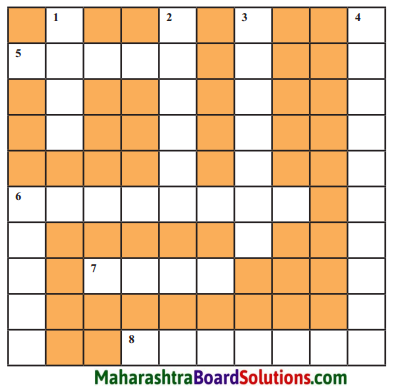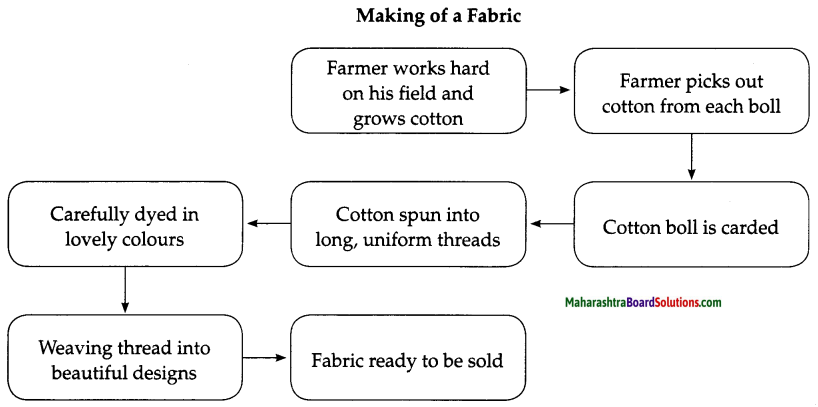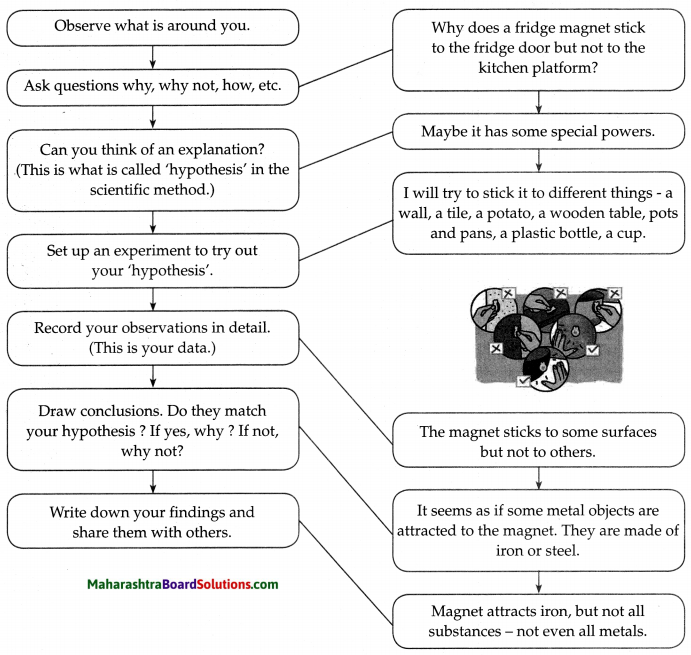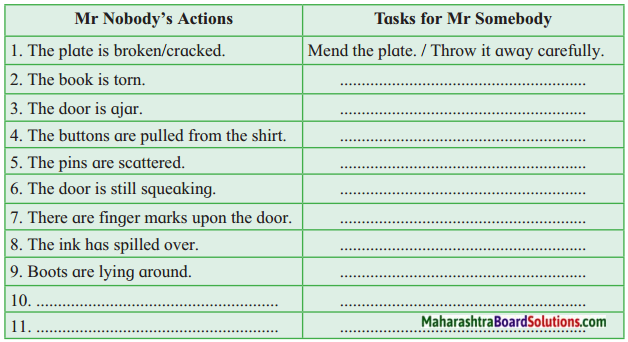Balbharti Maharashtra State Board Class 6 History Solutions Chapter 3 The Harappan Civilization Notes, Textbook Exercise Important Questions and Answers.
Std 6 History Chapter 3 Question Answer The Harappan Civilization Maharashtra Board
Class 6 History Chapter 3 The Harappan Civilization Question Answer Maharashtra Board
The Harappan Civilization Class 6 Questions And Answers
1. Answer in one sentence:
Question 1.
How did the civilization get the name Harappa?
Answer:
Archaeological excavation first began in 1921 CE at Harappa in Punjab on the banks of river Ravi. That is how this civilization came to be known as Harappan civilization.
Question 2.
What patterns are seen on the Harappan pots?
Answer:
There are red terra cotta pots with patterns and designs in black colour. The patterns includes fishscales, interlocking circles, pipal leaves, etc.
![]()
Question 3.
What cloth did the Harappan traders supply to Egypt?
Answer:
The Harappan traders supplied muslin cloth to Egypt
2. What will you do when you visit an ancient site to obtain more information about it, to conserve it, etc ?
3. Draw a picture of the Great Bath at Mohen-jo-daro.
Answer:
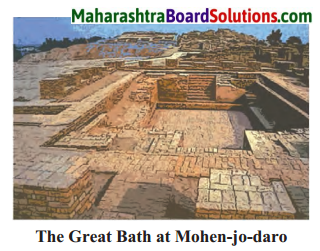
- A spacious bath has been discovered at Mohen-jo-daro.
- The tank in the Great Bath was nearly 2.5 metres deep, 12 metres long and 7 metres wide.
- It was lined with baked bricks to prevent seepage of water.
- There were steps leading down to the tank.
- There was also a provision for draining, cleaning and re-filling the tank at regular intervals.
4. In the following chart, fill in the details regarding human life during the Harappan period.
| Major crops | Clothes | Ornaments |
Answer:
| Major crops | Clothes | Ornaments |
| Wheat, | Knee length cloth worn by both men and women. Cloth that makes an upper garment. | Gold |
| Barley | A cloak with a beautiful trefoil, pattern draped across the shoulder. | Copper |
| Ragi | Precious | |
| Cotton | stone, Shells |
![]()
5. Answer in one word and frame similar questions. Write their answers:
Question 1.
What stone was used to make the Harappan seals?
Answer:
Steatite
6. On an outline map of the world, show the other civilizations that existed in other parts of the world during the Harappan period.
Activity:
- Prepare an outline map of your school and show the various places like a library, playground, computer room, etc. on the map.
- Prepare a detailed note on the grain storage system used in your family and your locality.
Class 6 History Chapter 3 The Harappan Civilization InText Questions and Answers
Can you tell?
Question 1.
Describe the structure of houses in your locality.
Answer:
In my locality (Mumbai) we have building structures and tall skyscrapers. In contrast, we do have hutmen locality with small houses in rows and sometimes chawls that are built upto one storey.(Answers may vary)
Question 2.
Do they have flat roofs or tiled sloping roofs?
Answer:
Houses or buildings in my locality have flat roofs and provisions are made for draining away the rain water. Some of the hutments do have tiled sloping roofs.
Question 3.
What problems regarding health and hygiene will arise if the drains are not covered?
Answer:
If the drains are not covered they will become infested or breeding grounds to mosquitoes, flies, insects, etc. This will directly affect the health of the people living in that vicinity. People will become victim to terrible illnesses, death rate may rise, children and senior citizens will be mostly affected as they have weaker immunity.
Question 4.
Visit a swimming tank in your locality. Observe how the water in the tank is changed. Compare a modem swimming tank to the Harappan Bath.
Answer:
When I went to a nearby swimming pool, I observed that there is a continuous flow of water and excess water filtering system where the water is cleaned. This clean water is then recycled again to be used in the pool. Every week the entire pool water is pumped out. The moss edges and walls of the pool are scrubbled clean with disinfectants.
Fresh water is then added to the pool, with right amount of chlorine tablets. We then have a pool with sparkling water. The Harappahs too, were hygienic as they too had provisions made for draining, cleaning and re-filling the Great Bath.
![]()
Class 6 History Chapter 3 The Harappan Civilization Additional Important Questions and Answers
Complete the sentence by choosing the correct option:
Question 1.
Archaeological excavation first began in 1921 CE at Harappa in the Punjab on the banks of river _______.
(a) Tapi
(b) Satluj
(c) Ravi
Answer:
Ravi
Question 2.
Excavations were also carried out at ______ a place about 650 km to the south of Harappa in the Indus valley.
(a) Mohen-jo-daro
(b) Dholavira
(c) Lothal
Answer:
Mohen-jo-daro
Question 3.
There was a striking _______ between the remains of structures and artefacts found at the two places.
(a) beauty
(b) sparks
(c) resemblance
Answer:
resemblance
Question 4.
The houses and other structures in the Harappan civilization were mainly built with ______ bricks.
(a) cooked
(b) baked
(c) fried
Answer:
baked
Question 5.
The houses had rooms built around a ________ courtyard.
(a) lateral
(b) central
(c) forward
Answer:
central
Question 6.
The _______ had covered drains built with bricks.
(a) streets
(b) compounds
(c) schools
Answer:
streets
Question 7.
The streets were ______ and laid out in a grid pattern.
(a) narrow
(b) zig-zag
(c) broad
Answer:
broad
Question 8.
The seals of the Harappan civilization were mainly square-shaped and made from a stone called ______.
(a) steatite
(b) granite
(c) marble
Answer:
steatite
![]()
Question 9.
These seals bear pictures of imaginary animals like the ________.
(a) phoenix
(b) unicorn
(c) fairies
Answer:
unicorn
Question 10.
_________ pots of various types and shapes have been found at the excavation sites of Harappan civilization.
(a) Metal
(b) Stone
(c) Earthen
Answer:
Earthen
Question 11.
The Harappan people ______ their dead.
(a) buried
(b) cremated
(c) incinerated
Answer:
buried
Question 12.
The tank in the Great Bath was nearly ________ metres deep.
(a) 12
(b)2.5
(c)7
Answer:
2.5
Question 13.
Great bath was lined with __________ bricks to prevent seepage of water.
(a) unbaked
(b) baked
(c) bunds
Answer:
baked
Question 14.
The Harappan people practised _______.
(a) singing
(c) dancing
(c) agriculture
Answer:
agriculture
Question 15.
The dress of both Harappan men and women consisted of knee length cloth and an _________ garment.
(a) upper
(b) head
(c) shawl
Answer:
upper
Question 16.
Women wore _________ right up to their upper arm.
(a) shawls
(b) flowers
(c) bangles
Answer:
bangles
Question 17.
The Harappan people carried on _________ within India as well as with countries outside.
(a) friendship
(b) trade
(c) enemity
Answer:
trade
Question 18.
The Indus valley was known for its high quality ______.
(a) cotton
(b) crops
(c) pots
Answer:
cotton
![]()
Question 19.
_______ was carried on both by land routes and sea routes.
(a) Agriculture
(b) Trade
(c) Industry
Answer:
Trade
Question 20.
A huge ________ has been discoverd at Lothal.
(a) dockyard
(b) fishery
(c) industry
Answer:
dockyard
Question 21.
People migrated to other places leading to the decline of ______.
(a) population
(b) trade
(c) cities
Answer:
cities
Match The following:
Question 1.
| Column A | Column B |
| (1) Harappan civilization | (a) Built with baked bricks |
| (2) Houses | (b) Had separate fortification |
| (3) Streets | (c) Banks of river ravi |
| (4) Mohen-jo-daro | (d) Had covered drains |
| (5) Towns | (e) South of Harappa |
Answer:
1 – c
2 – a
3 – d
4 – e
5 – b
Question 2.
| Column A | Column B |
| (1) Seals | (a) An imaginary animal carved on seals |
| (2) Unicorn | (b) High quality cotton |
| (3) The Great bath | (c) Made of stone called steatite |
| (4) The Indus Valley | (d) Had provision for draining, cleaning and refilling the tank |
Answer:
1 – c
2 – a
3 – d
4 – b
Answer in one sentence:
Question 1.
Where was the excavation of Mohen-jo-daro carried out?
Answer:
The excavation of Mohen-jo-daro was carried out about 650 km to the south of Harappa in the Indus valley.
Question 2.
With what were the houses and other structures in Harappan civilization built?
Answer:
The houses and other structures in Harappan civilization were built with baked bricks.
Question 3.
What were the Harappan seals made from?
Answer:
The Harappan seals were made from a stone called steatite.
Question 4.
What were the seals used for?
Answer:
The seals were used as stamps.
Question 5.
Which pictures were depicted on seals?
Answer:
Pictures of animals like bulls, buffaloes, oxen, elephants, rhinos, tigers, unicorn, etc., were depicted on seals.
Question 6.
What occupation did the Harappan practise?
Answer:
The Harappans practised agriculture.
![]()
Question 7.
What crops did the Harappans grow?
Answer:
The Harappans grew crops like wheat, barley, ragi, peas, sesame and lentils (masoor).
Question 8.
How did the people in Harappa dress?
Answer:
The dress of both men and women in Harappa consisted of knee length cloth and an upper garment.
Question 9.
What were their ornaments made up of?
Answer:
Their ornaments were made up of gold, copper, precious stones as also shells, cowries, seeds, etc.
Question 10.
What is the Indus valley known for?
Answer:
The Indus valley was known for its high quality cotton.
Question 11.
To which countries was the cotton exported?
Answer:
The cotton was exported to regions like west Asia, southern Europe and Egypt.
Question 12.
Where was the Harappan dockyard discovered?
Answer:
A huge dockyard was discovered at Lothal.
Question 13.
What was the reasons for the decline of the Harappan civilization?
Answer:
Frequent floods, invasions by foreign tribes, decline in trade were some of the reasons for the decline of Harappan civilization.
Question 14.
Why did the people migrate to other places?
Answer:
Some regions became arid due to weakening of monsoon, drying up of river basins, earthquakes, changes in sea-level, etc. This led the people to migrate to other places.
Answer the following questions in short:
Question 1.
Which similar characteristics are seen in all the places of Harappan civilization?
Answer:
Similar characteristics that are seen in all the places of Harappan civilization are town planning, roads, construction of houses, drainage system, seals, pots, toys and burial customs.
Question 2.
Describe the houses built in Harappa.
Answer:
- The houses in Harappa had rooms built around a central courtyard.
- The houses had wells, bathrooms and toilets.
Question 3.
Explain why the drainage system excelled in Harappa.
Answer:
- The Harappans had an excellent drainage system in which baked earthen conduits were used.
- The streets had covered drains built with bricks.
- All these shows great concern regarding public health.
![]()
Question 4.
Describe the streets in Harappan town planning.
Answer:
- The streets in Harappan towns were broad and laid out in a grid pattern.
- The streets had covered drains on either sides.
Question 5.
What ritual did the people in Harappa follow for their burial?
Answer:
- The Harappan buried their dead.
- They used to bury earthern pots along with the dead during their burial.
Question 6.
Describe the Great Bath of Mohen-jo-daro.
Answer:
- A spacious bath has been discovered at Mohen-jo-daro.
- The tank in the Great Bath was nearly 2.5 metres deep, 12 metres long and 7 metres wide.
- It was lined with baked bricks to prevent seepage of water.
- There were steps leading down to the tank.
- There was also a provision for draining, cleaning and re-filling the tank at regular intervals.
Question 7.
Describe the statue found at a Harappan site.
Answer:
- A statue found at Harappan site presents an excellent specimen of their art.
- It shows the man’s facial features very clearly.
- A clock with a beautiful trefoil pattern is draped across his shoulder.
Question 8.
Comparison between today’s modem town planning with that of the Harappan periods.
Answer:
Harappan houses were built in rectangular blocks and had excellent roads and drainage system.
In comparison, the older cities in India do not have the Harappan style of town planning. There are places in these older cities where hutmen live in congested areas with open drainages. But today, changes are being made.
![]()
Open drainages are being replaced by underground drainage system. Rain water is diverted to avoid floods and hutmen’s areas are getting transformed into tall high-rise buildings. Cities now in India are getting transformed with broad roads, well interstate connecting highways, bridges, railway, metro, airports, etc.
6th Std History Questions And Answers:
- The Indian Subcontinent and History Class 6 History Questions And Answers
- Sources of History Class 6 History Questions And Answers
- The Harappan Civilization Class 6 History Questions And Answers
- The Vedic Civilization Class 6 History Questions And Answers
- Religious Trends in Ancient India Class 6 History Questions And Answers
- Janapadas and Mahajanapadas Class 6 History Questions And Answers
- India during the Maurya Period Class 6 History Questions And Answers
- States after the Maurya Empire Class 6 History Questions And Answers
- Ancient Kingdoms of the South Class 6 History Questions And Answers
- Ancient India: Cultural Class 6 History Questions And Answers
- Ancient India and the World Class 6 History Questions And Answers
